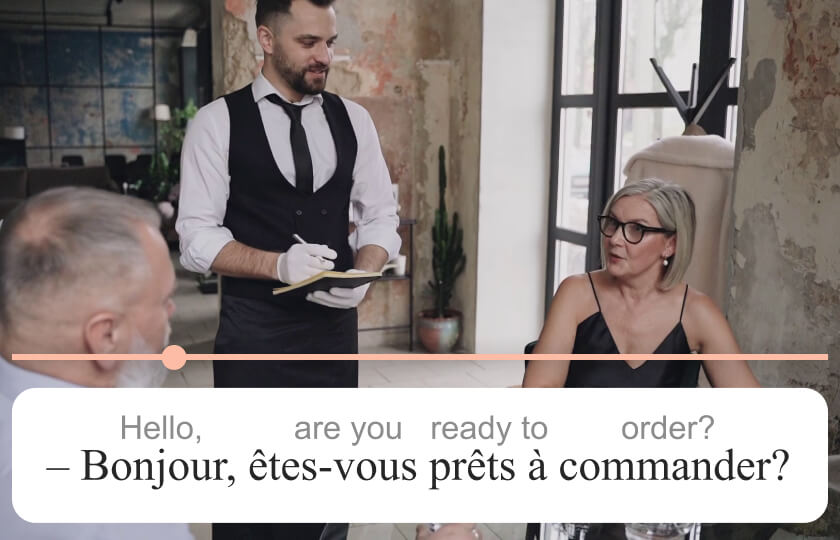Want to dine like a local in France? Here are the essential words and phrases for ordering food in French:
- Learn key phrases:
- Bonjour: Hello
- S’il vous plaît: Please
- L’addition: The check
- Understand menu basics:
- L’entrée: Appetizer
- Le plat principal: Main dish
- Le dessert: Dessert
- Know how to order:
- Je voudrais…: I’d like…
- Je vais prendre…: I’ll have…
- Express preferences:
- Pay and leave:
- L’addition, s’il vous plaît: The check, please
Master these basics to enhance your dining experience and show respect for the local culture.
Related video
Basic French Restaurant Words
A few key phrases can turn an awkward meal into a smooth experience. Let’s look at the must-know French restaurant vocab for reading menus and chatting with staff.
Greetings and Pleasantries
Start off on the right foot:
- Bonjour: Hello (before 6 PM)
- Bonsoir: Good evening (after 6 PM)
- S’il vous plaît: Please
Decoding the Menu
In France, the menu is called la carte. Here’s what you’ll see:
- L’apéritif: Pre-dinner drink
- L’entrée: Appetizer (not the main course!)
- Le plat principal: Main dish
- Le fromage: Cheese
- Le dessert: Dessert
- Le digestif: After-dinner drink
Money-saving tip: Look for le menu or menu du jour. These fixed-price meals can be cheaper than ordering à la carte.
Food and Drink Basics
Get to know these common terms:
- La viande: Meat
- Le poisson: Fish
- Les légumes: Vegetables
- Le pain: Bread
- La soupe: Soup
- La salade: Salad
Thirsty? Try these:
- Un verre de vin: A glass of wine
- Une bouteille: A bottle
- La bière: Beer
- Le café: Coffee (usually espresso)
How to Order Your Food
Let’s get into the nitty-gritty of ordering food in French. We’ll cover everything from snagging a table to picking your meal.
Getting a Table
Walk in and say:
- “Bonjour, une table pour deux, s’il vous plaît.” (Hello, table for two, please.)
- For bigger groups, just swap “deux” with your party size.
Or:
- “Avez-vous une table disponible?” (Got a free table?)
Getting the Menu
Once you’re seated:
- “Pouvez-vous nous apporter la carte, s’il vous plaît?” (Menu, please?)
Pro tip: In France, “la carte” means menu. “Le menu” is usually a fixed-price meal. Don’t mix them up!
Ordering Drinks
Before food, drinks. Here’s a quick guide:
- Water: “Une carafe d’eau, s’il vous plaît.“
- Wine: “Je voudrais un verre de vin rouge/blanc.“
- Beer: “Une bière, s’il vous plaît.“
- Coffee: “Un café, s’il vous plaît.“
Ordering Food
Ready to eat? Say:
- “Nous sommes prêts à commander.” (We’re ready to order.)
Then:
- “Je voudrais…” (I’d like…) or “Je vais prendre…” (I’ll have…)
Example:
- “En entrée, je voudrais la soupe à l’oignon.” (For starters, I’ll take the onion soup.)
- “Comme plat principal, je vais prendre le steak-frites.” (For the main, I’ll have the steak and fries.)
Expressing Preferences
Want to know what’s good? Ask:
- “Qu’est-ce que vous recommandez?” (What do you recommend?)
- “Quelle est la spécialité du jour?” (What’s today’s special?)
Got specific tastes? Say:
- “Je préfère la viande bien cuite.” (I like my meat well-done.)
- “J’aime beaucoup les plats épicés.” (I’m big on spicy food.)
Talking About the Menu
Let’s dive into the French dining experience. Here’s how to ask about dishes, make special requests, and communicate your dietary needs.
Asking What’s in the Food
Curious about a dish? Just ask:
- “Qu’est-ce que c’est?” (What is this?)
- “Quels sont les ingrédients?” (What are the ingredients?)
For example: “Qu’est-ce que la tartiflette?” (What’s tartiflette?)
Changing Your Order
Need to switch things up? Try these:
- “Est-ce que je peux remplacer le riz par des légumes?” (Can I substitute rice with vegetables?)
- “Je n’ai pas commandé ça. J’ai pris X.” (I didn’t order this. I had X.)
How You Want Your Food Cooked
When ordering meat, specify your preferred doneness:
Just say: “Je voudrais le steak à point, s’il vous plaît.” (I’d like the steak medium, please.)
Food Allergies and Diet Needs
Got dietary restrictions? Here’s how to communicate them:
- “Je suis allergique à…” (I’m allergic to…)
- “Je suis végétarien(ne)” (I’m vegetarian)
- “Je suis végétalien(ne)” (I’m vegan)
- “Je ne mange ni viande ni poisson” (I don’t eat meat or fish)
For severe allergies, be crystal clear:
- “J’ai une allergie mortelle à…” (I have a lethal allergy to…)
French culinary expert Marie Dubois warns: “In France, vegetarianism might raise eyebrows. Be specific when ordering to avoid mix-ups.“
Asking About Serving Size
Want to share? Ask:
- “Est-ce qu’on peut partager?” (Can we share this?)
Curious about portion size? Try:
- “Quelle est la taille de la portion?” (What’s the portion size?)
Paying and Leaving
You’ve finished your meal. Now it’s time to wrap up your French dining experience. Here’s how to handle the final steps smoothly.
Asking for the Check
In France, servers won’t rush you. They’ll wait for you to ask for the bill. When you’re ready, just say:
- “L’addition, s’il vous plaît.” (The check, please.)
Don’t yell “Garçon!” – it’s rude. In casual places, you might need to pay at the counter.
“French dining is all about taking your time. Servers give you plenty of space between courses”, says Jean-Pierre Vigato, chef-owner of the two-Michelin-starred Apicius in Paris.
Ways to Pay
Most French restaurants take different payment methods. Here’s a quick guide:
- “Je peux payer par carte?” (Can I pay by card?)
- “Je paierai en espèces.” (I’ll pay in cash.)
- “On va faire moitié-moitié.” (We’ll split it half and half.)
Not sure where to pay? Ask: “Est-ce qu’on paie ici ou au comptoir?” (Do we pay here or at the counter?)
Tips and Service Charges
Tipping isn’t a must in France, but it’s nice for great service. Your bill already includes a 15% service charge by law. For top-notch service, you can add an extra 5-10%. In casual spots, rounding up or leaving a few euros is fine.
For example, if your coffee costs €2.70, you might leave €3, tipping 30 cents.
“Big tips can seem weird or showy in France. Small amounts are better”, says Sophie Marceau, a famous French actress who loves Parisian cafés.
Saying Goodbye
As you leave, it’s polite to say:
- “Merci beaucoup, au revoir!” (Thank you very much, goodbye!)
- “Bonne soirée!” (Have a good evening!)
French Table Manners 101
1. Hands on the table, not in your lap.
2. Wait for everyone to be served and the host to say “Bon appétit!” before eating.
3. Use utensils for most foods, even pizza and sandwiches in restaurants.
4. Clean your plate. Leaving food is a no-no.
French meals are marathons, not sprints. Lunch might last 1.5 hours, dinner up to 3. Slow down and savor the experience! If you’re in a hurry, tell your server when you sit down.
Wrap-up
Getting good at French restaurant talk isn’t just about food. It’s your pass to really experiencing French culture.
The French love it when you try to speak their language. Your efforts can lead to friendlier service and tips on the best local eats.
So, keep at it. Stay curious. Have fun with it. Soon, you’ll be chatting with waiters like you grew up in Paris. Bon appétit et bonne chance!

